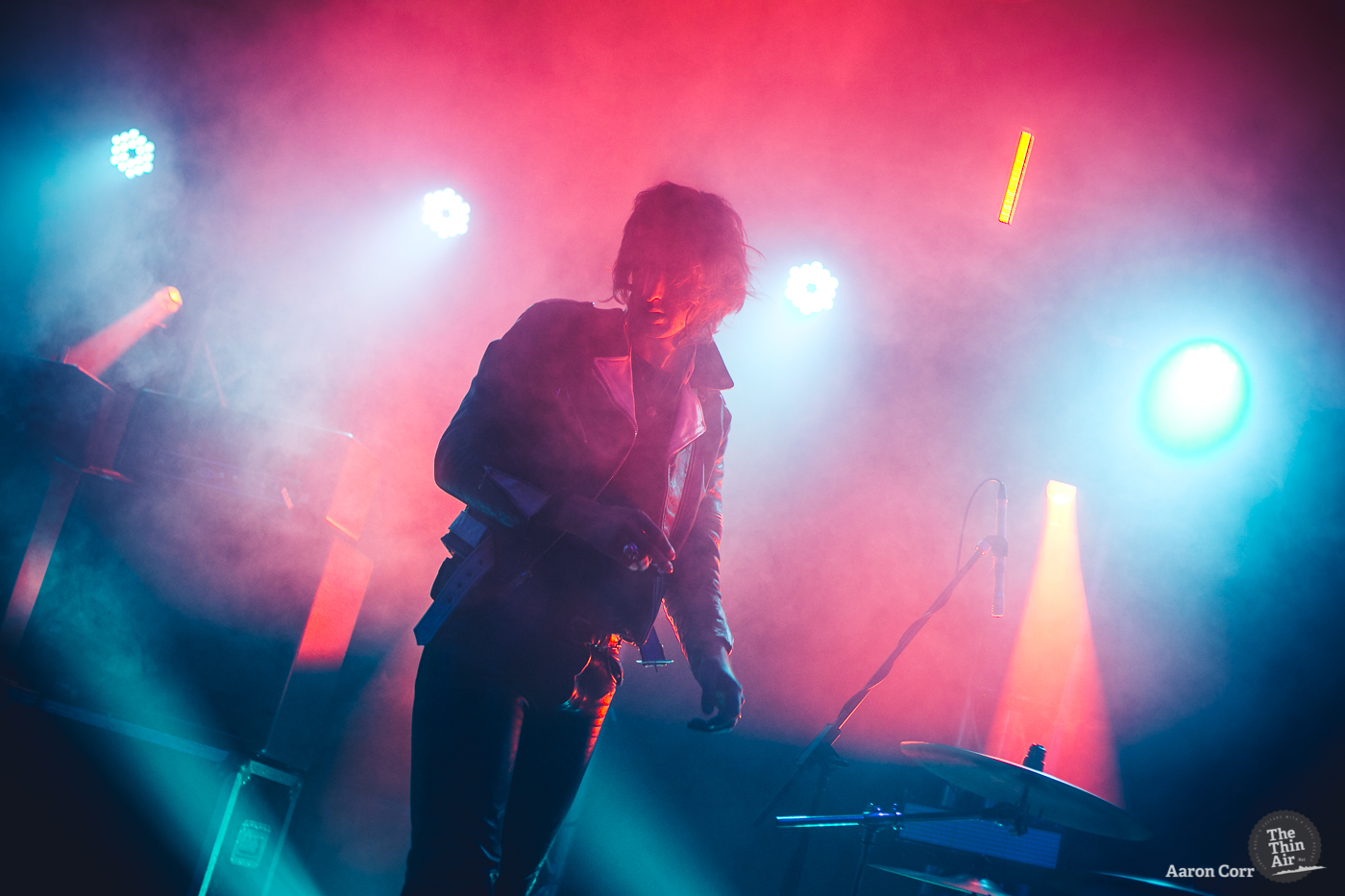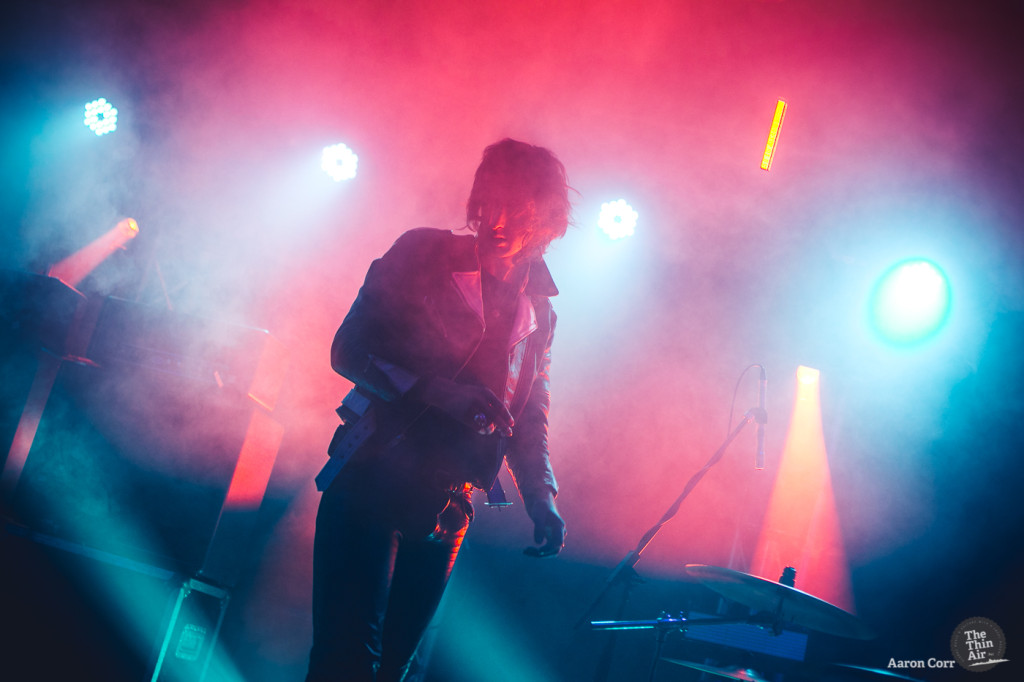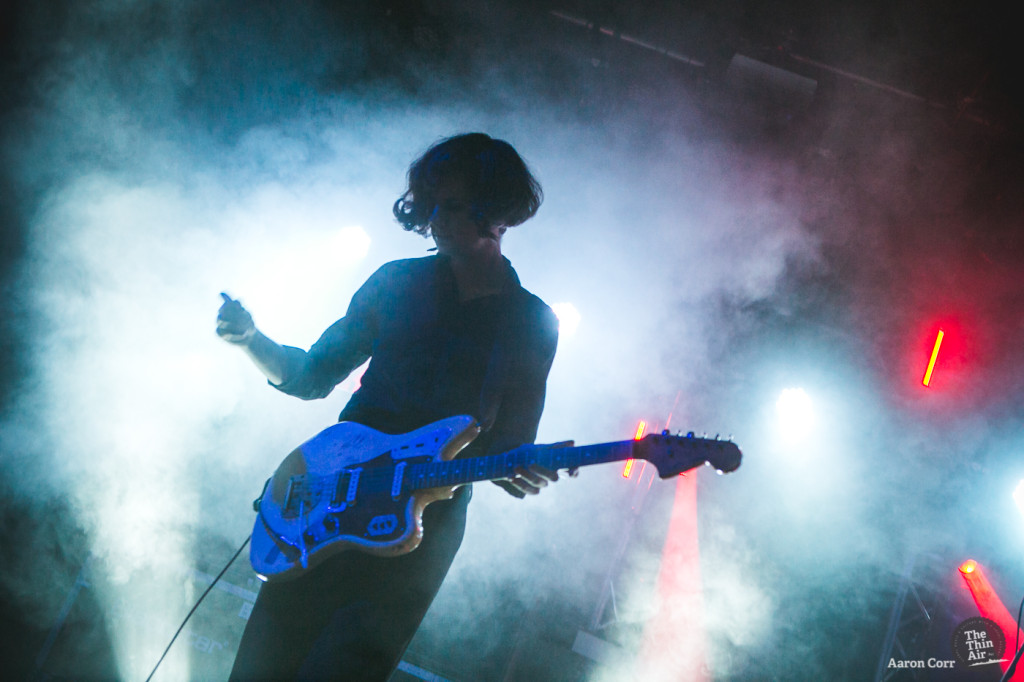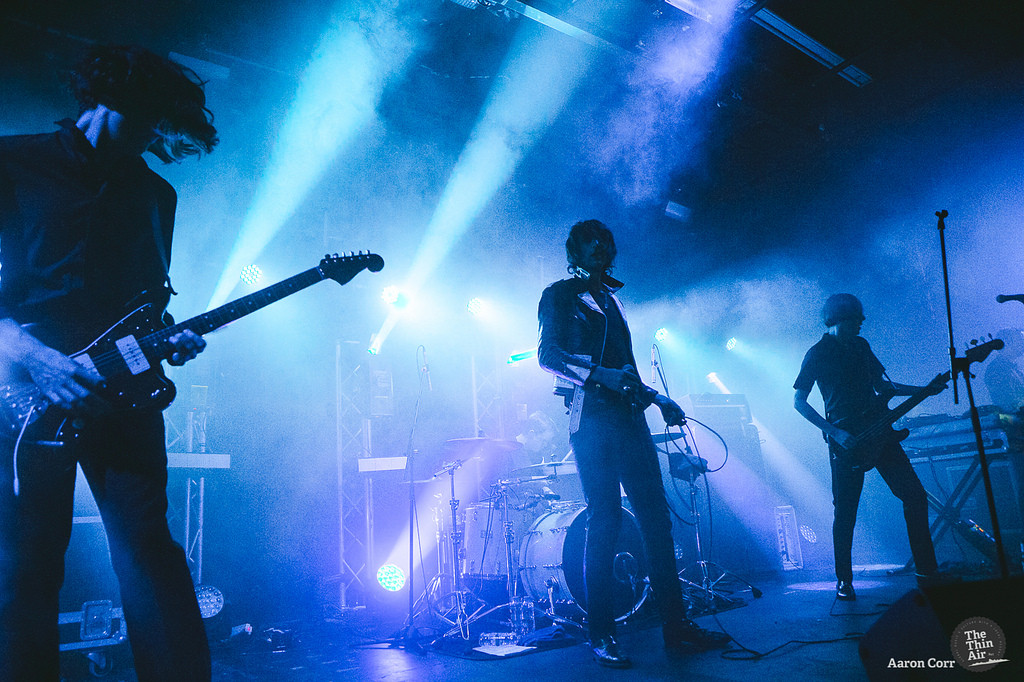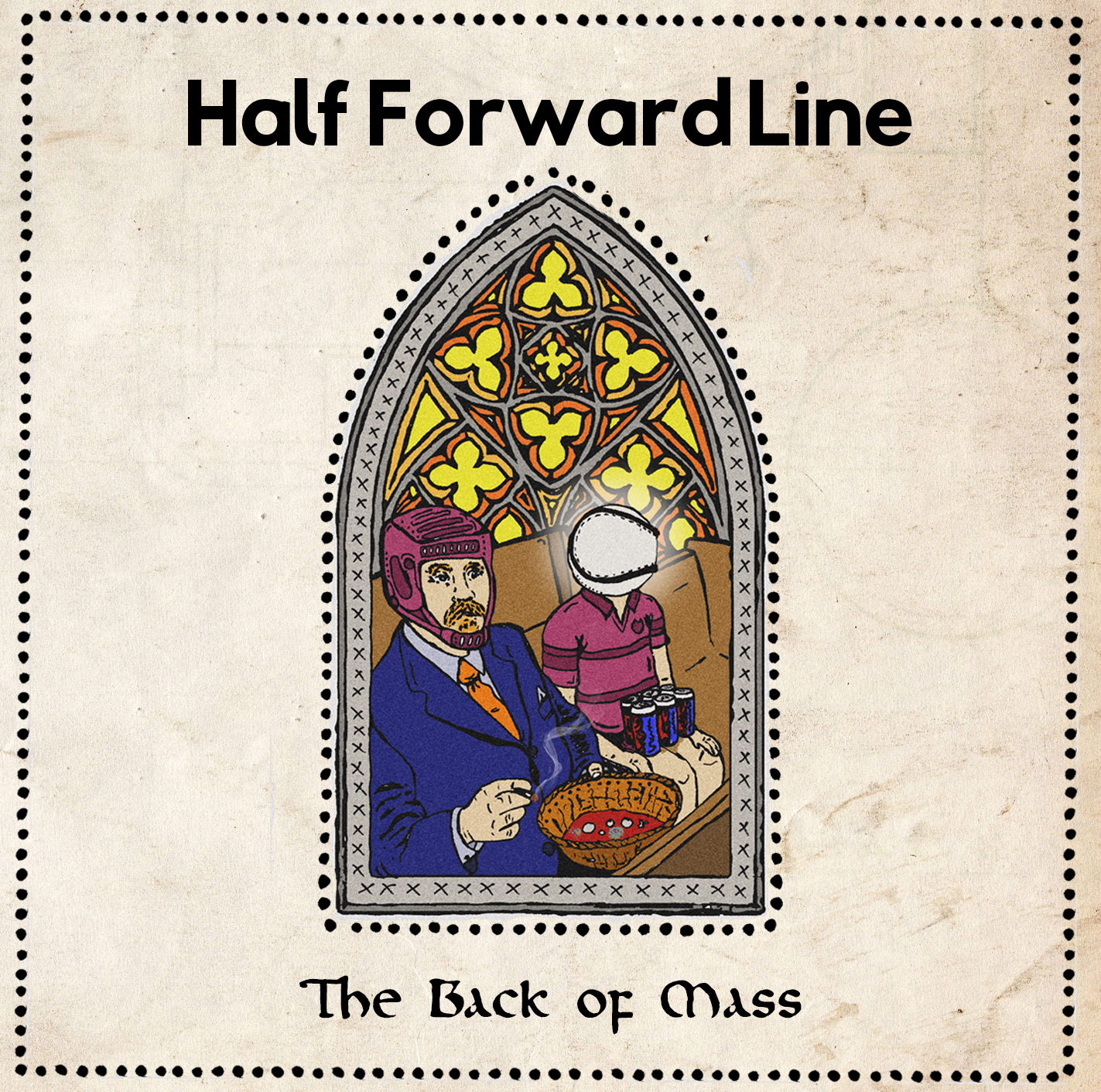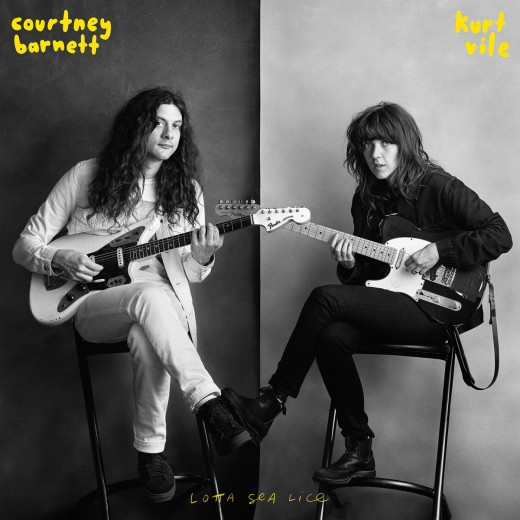One third of quite possibly the country’s finest podcast NO ENCORE, freelance music scrivener and all-round man about (Dublin) town Dave Hanratty had a rather lovely yak with Faris Badwan and Joshua Hayward of the positively regenerated The Horrors recently. He transcribed it and here we are. What a world.
Photos by Aaron Corr
Faris Badwan is furious. Frankly, he has every right to be. The endlessly tall frontman of The Horrors has been betrayed, stabbed in the back with casual disregard by his guitarist, one Joshua Hayward.
Just seconds after revealing that the pair are working on separate soundtracks for upcoming sci-fi films, the subject of Blade Runner 2049 is raised, as your reporter enquires as to whether or not they have seen the long-awaited follow up to Ridley Scott’s classic dystopian noir…
Joshua Hayward: Yeah.
Faris Badwan: We’re doing a – you’ve seen it?
Hayward: Yeah.
Badwan: You fucking prick, we’re supposed to be doing a band outing to see it.
Hayward: Yeah, I want to see it again.
Badwan: When did you watch it?
Hayward: After we had rehearsal the other day.
Badwan: So, after we discussed that we were all gonna go and watch the new Blade Runner, you decided to take it upon yourself to go and watch it before the band.
Hayward: I was going to the pub to meet someone and they said, ‘Oh I’m not in the pub anymore, I’m going to see Blade Runner, so I thought fuck it, I’ll just go see Blade Runner.
Badwan: You prick! You’re such a dick.
Hayward: It’s so good. I want to watch it again.
Badwan: Yeah, but someone invited me out the other day to go see the new Blade Runner and I thought, ‘No, I’m not going to spoil it, I’m going to save it for the band outing’.
Hayward: Oh, you’re sounding like my girlfriend right now…
Badwan: Well she has a good point, and you should listen to her more often.
It’s somewhat fitting that the bandmates would come to mock-blows in the environs of Dublin’s Tivoli Theatre; home to regular good-natured fisticuffs in the form of an independent wrestling troupe. As it happens, Badwan’s brother Tarik is currently training in the ancient choreographed grappling arts when not fronting alt-rock outfit LOOM – for the record, Faris was a WCW man, partial to Bret ‘The Hitman’ Hart or the late Ultimate Warrior.
Backstage a handful of hours before they officially kick off their UK tour in the wake of a cancelled Belfast show courtesy of Hurricane Ophelia, Badwan and Hayward are in good form, ready to bring their fifth album – the aptly-titled and quite excellent V to a baying audience. Their relaxed confidence is understandable, for V manages to speak clearly as the natural successor to the focused path previously walked by Primary Colours, Skying and Luminous, while also representing something of a fresh start.
Some credit for that shake-up goes to super-producer Paul Epworth, who literally brought the band out of their comfort zone as they swapped their very own Horrors HQ for a different space, and a direct approach.
There was something of a ‘rip it up and start again’ nature to this album.
Badwan: I think there was a rip it up and start again nature to the process, I would say. I don’t know if we intended on completely starting from scratch musically, because we’ve never really intended on doing that. But, just naturally, if you look at our old records, the process has changed a lot on each one apart from Luminous. That record and Skying were made in a similar way, while Strange House was written between tours, a few days at a time and pieced together. Primary Colours was in Bath with Geoff Barrow, recording old demos. And then Skying and Luminous, we built our own studio.
By the time V came around, we’d had our own studio for about seven years and it had gotten a bit claustrophobic, so we couldn’t face going in there anymore. We wanted to work with a producer who was almost a member of the band – which we had never done before – and see what came out of it. We tried a lot of different ways of writing songs. I think that had the biggest impact on how it sounded.
It’s an interesting union with Paul Epworth. He’s known for massive pop records and working with the likes of Adele and Rihanna.
Badwan: The thing is that Paul is known for those records, but he’s been working a long time and he’s been doing loads of great stuff before his big pop hits, so he’s from a very similar world to us, especially in terms of experimentation – he’s got every synth in existence, I think. We didn’t have to rely on Josh so much for the engineering, so having a guitarist who could actually play guitar for most of the day was useful.
Hayward: It is such a relief not to have to worry why there’s noise on line five, and crap like that, which is what you end up doing if you have a studio. You’re just worrying about insignificant things… well, they are significant, obviously, but they’re uncreative problems.
Badwan: Josh did manage to get a part-time assistant who looked identical to him, in our old studio, which was quite funny.
Hayward: It was my little brother! I actually asked to work with Paul about 15 years ago. I think he might have finally just realised…
Badwan: Tell the story, because it’s ridiculous.
Hayward: When I was a student, Paul Epworth turned up at a party at my house and passed out on my bed. I was like ‘Who the fuck is this guy?’, and they were like ‘Oh, it’s Paul Epworth, he’s a producer’, so I went, ‘Oh, you think he’ll give me a job as an engineer?’, but they said ‘Well you can’t ask him now, he’s passed out, but before you forget, write him a note’, and so I wrote him this long note saying how good I was at making tea and all the rest of it, put my number on it and hid it in his pants, then carried on with the night. Five hours later he comes up the stairs – ‘Who the fuck is Josh? Why you been touching my willy?!’. It’s like, well, you were in my house, mate. ‘Oh, sorry.’
Badwan: Josh’s house rules. You’ve got to allow full coverage.
Hayward: He never phoned me, weirdly. I think he thought we’d gotten too intimate too quickly, but he realised that now was the time.
Serious business in the studio then.
Badwan: Friday night was party night, which was the night we usually chose to work on ‘Hologram’. Consequently, it ended up about 25 minutes long at one point, so we had to cut that down. I feel like because our records have a lot of layers, they sound terrible for about 90 percent of the process. You’re freaking out, going, ‘This sounds like shit’, and in the last couple of months it all turns around; you put it together, you mix it properly, and you get everything sounding right. The balance is so important. We wrote a lot of songs, and it was quite late on that the record took shape and we understood what it sounded like.
Do you pay attention to the press? A lot of critics seem to subscribe to the idea of The Horrors as something of a narrative arc with an upward trajectory…
Badwan: Britain loves an underdog, don’t they?
I guess so. How does that work come World Cup time, though?
Badwan: Well, yeah, apart from in football. They don’t love an underdog in football. But they might come around to love the national team more now that… well, there was never any hope, but now it’s clear that there’s no hope. Back to reality.
If you read those reviews, people are saying that it’s amazing to have a band ascend rather than fade away. If you look at Wild Beasts, for instance, who are splitting up – they’ve been on the road as long as The Horrors and they’ve admitted to struggling. How have you guys managed to do the evolution in the right way?
Hayward: Be really selfish about it. I think that’s a good way of going about it.
Badwan: You should be selfish, as a band. You should try and please yourself. Everyone says that they try to please themselves, but I don’t know whether that’s true or not. I don’t know if we have many options, really. I don’t know what I would be doing otherwise. I don’t think any of us intended on The Horrors being our career. We definitely fell into it, but I think we’ve remembered what we enjoyed about the beginning. It’s weird when you look at it; there aren’t very many bands who are still around from when we began. I guess the life of a band is even shorter now.
Do you go back to a record like Strange House? It is 10 years since its release…
Badwan: Go back to it, like listen to it? I don’t listen to any of our records. None of us do.
Hayward: It’s weird, you make a record and you work on it for however long, and you’re completely in it, you have this thing and you’re listening to it when it’s finally been mastered and you sign it off. Then it gets released and it becomes everyone’s record. It’s not really yours anymore. Everyone listens to it in a completely different way to how you listened to it. I’d rather listen to music from the other side, rather than inside.
Badwan: There’s no ownership with the music you make, and that’s kind of the way it should be.
Hayward: Where everyone has ownership of music that someone else has made, they relate it to a specific time in their lives.
Badwan: That’s exactly it. That’s the cool thing, when someone has a completely personal meaning. That’s what makes them connect with things, and if you’re expecting to dictate how that’s happening, it’s not really realistic.
Going back to Paul for a second; was he particularly challenging?
Badwan: He was challenging in the sense that he stopped us being so challenging. We have a tendency to ditch things before they’ve even begun, and he was really good at getting us to hold off on judging things too early. I think when you’re being creative, you have to suspend your judgement. You can’t be too eager to say what something is and discount it, you have to see it through a little bit. It worked for us. That one thing was the biggest factor.
Hayward: He’s quite weird in that he has that, but on the flip side he has quite a short attention span. So you get half an hour to do a part and if you’ve not nailed in half an hour he’s like, ’No, next, bored’, so there’s a constant scrambling to try and get everything done. It became quite fun, because you’re being really instinctual and you end up not thinking about anything, just playing and doing what feels right. It’s a very quick, moving session.
Is V the start of a new chapter?
Badwan: Yeah, definitely. It feels like it’s opened a lot of doors and I’m normally so exhausted after making a record, like the last thing I’d want to do is go back into the studio, but I feel like we could go and write more songs now.
I notice you guys are on Instagram now.
Badwan: Yeah, it’s happened. We’re doing it. You can’t live in the past.
You did share a photo from the past, though, with Jay-Z…
Badwan: Yeah!
And you noted that it was an ‘awkward’ exchange. How so?
Badwan: It was a little awkward, yeah. There were a lot of pauses between sentences, and I guess none of us really knew what we were doing there or why, it was like two worlds that shouldn’t have encountered each other. He was alright, though…
Hayward: We were signed to his label! You could have been nice!
Badwan: We were nice! He was nice! To be honest, I’m not knocking Jay-Z, because he was actually very accommodating to basically what must have looked like a couple of freaks. He was fine, it was just… a little awkward.
V is out now

